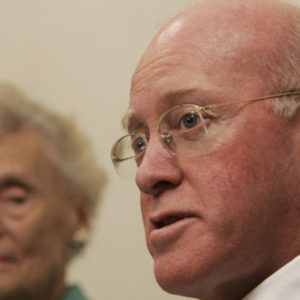New Hampshire Secretary of State Bill Gardner is frustrated.
Twice now, his fellow Granite State Democrats, Reps. Annie Kuster and Chris Pappas, have voted to override the state’s election laws and replace them with laws written in Washington, DC. And twice, they’ve declined to talk to him — the state’s top election official — about it.
“They’ve never asked me about it,” Gardner told NHJournal in a recent interview, the same answer he gave after House Democrats passed H.R. 1 in the early days of 2019.
Gardner’s frustration isn’t with the specifics of the legislation — well, not entirely. New Hampshire already has some of the election laws mandated by H.R. 1, like same-day voter registration and allowing felons to vote as long as they aren’t incarcerated. And Gardner’s team put together a mail-in balloting system for the COVID-19 plagued 2020 election that resulted in a record turnout. All without a federal mandate.
And that’s Gardner’s frustration. He believes in local elections. And he believes New Hampshire’s long record of success proves they work.
“One size fits all election laws don’t fit New Hampshire,” Gardner said. “What works in Texas won’t work here.”
His fellow Democrats don’t agree. Kuster and Pappas both voted for H.R. 1 –the For The People Act — which takes away the right of New Hampshire (and every other state) to:
— Require voter ID to vote.
–Require ID in order to register to vote.
–Require mail-in ballots to be witnessed or
–Prohibit or restrict “ballot harvesting,” the practice of campaign or party workers collecting ballots from voters and turning them in.
The bill would also mandate at least 15 days of early voting, a practice the Granite State has long rejected. More problematic, Gardner says, is the requirement New Hampshire count ballots that don’t arrive until 10 days after the election.
“This goes against our state constitution. Not just our election laws, but our constitution, which requires the [town] moderator to announce the results of all the elections before they leave the polling place.”
In 2020, Democrats led by Hillary Clinton’s campaign attorney Marc Elias, sued to force the state to accept late ballots. They lost.
“You can show up and vote on the day after the election, but it won’t be counted,” Gardner added. “In New Hampshire, we have one Election Day, not two.”
And then there’s another aspect to the H.R. 1 approach of overriding state election laws. “If Congress can tell us how to vote, and that we have to let people vote early and vote late, why can’t they tell us when we can have our primary?” Gardner asks. “If they can go against our constitution, they can override our First In The Nation law.”
Neither Pappas nor Kuster would answer questions from NHJournal about their votes for H.R. 1, or any of its elements — including using public money to pay for campaign ads. According to the National Republican Congressional Committee, candidates like Pappas and Kuster could receive up to $5 million in taxpayer monies to pay for attack ads and campaign strategists.
However, they both specifically mentioned “voter suppression” as one of the reasons they backed the bill. That’s another reason Gardner is frustrated.
“They keep talking about voter suppression. We just had the highest voter turnout in 50 years,” Gardner said. “The United States had more than 60 percent turnout of its voting-age population for the first time since the 1960s.” New Hampshire’s 72.2 percent turnout was the third-highest in the nation and was the highest since 1964.
“We have higher voter turnout than mail-in ballot states like Oregon and Colorado, and they want to change our laws? California has lots of mail-in voting and they have one of the worst turnout rates,” Gardner notes.
Sens. Maggie Hassan and Jeanne Shaheen are co-sponsors of the Senate version of the bill. However, the legislation has little hope of getting the 60 votes required to end debate. Activists who support the legislation are demanding Democrats use the “nuclear option” to get rid of the filibuster via a simple majority vote.
Will the two Granite State senators vote to kill the filibuster rule in order to pass this bill?
“No,” Shaheen reportedly told CNN when asked about eliminating the 60-vote threshold. “I think we should look at ways to reform the filibuster, but I don’t think getting rid of it is the best approach.” The network also reports Hassan “has concerns about eliminating the filibuster.”
Gardner believes changing election laws via fiat will only raise doubts about an election system that, in New Hampshire at least, isn’t broken. “We probably have more recounts than anybody,” Gardner said. “We have House races that come down to just a few votes. But everyone pretty much trusts the system.”
Gardner’s fellow Democrat, Sen. Joe Manchin of West Virginia, raised the trust issue as well.
“Even though our democratic institutions have survived foreign interference and a violent attempt to enter the United States Capitol during the counting of Electoral College votes, America’s declining trust in the government and each other makes it harder to solve key problems,” Manchin said in the statement. “That trust will continue to diminish unless we, as members of Congress, transcend partisanship to strengthen our democracy by protecting voting rights, implementing common-sense election security reforms, and making our campaign finance system more transparent.”





